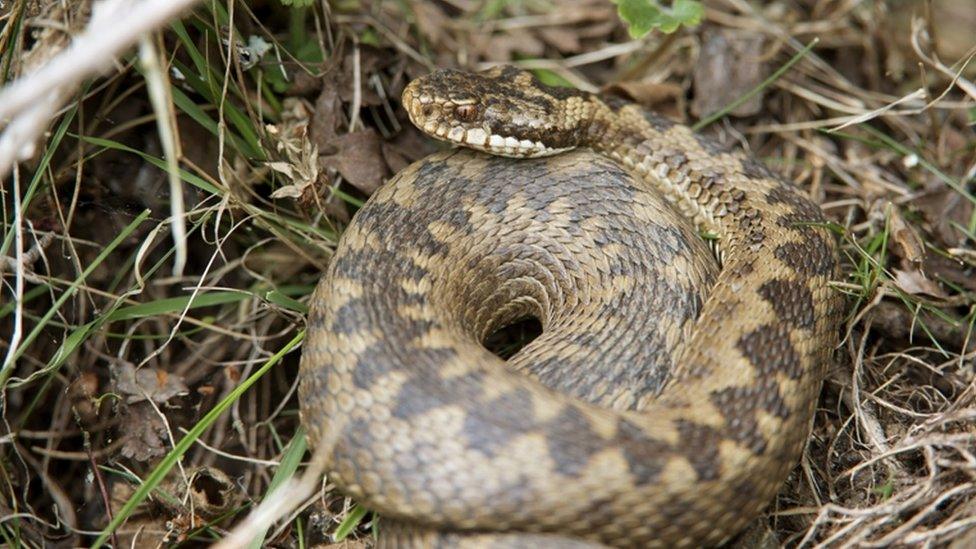Dog dies after 'adder bite' in Stirling garden
- Published

Experts said adders could "shuttle" in and out of hibernation during the winter
A dog lover has told how a bite from a snake, apparently woken from hibernation by the pre-Christmas mild spell, claimed the life of her pet.
Three-year-old whippet North was bitten in the garden of Rosaline Corsar's home in St Ninians, Stirling, on 22 December.
Despite efforts by vets, his kidneys failed and the prize winning dog had to be destroyed eight days later.
Adders are the only venomous snakes in the UK and usually inactive in winter.
However, it is thought the mild weather in December could have encouraged the one that bit North to come out of hibernation.
Experts at Glasgow Veterinary School's small animals hospital, where North was treated, carried out tests and believe the death was probably the result of an adder bite.
Ms Corsar said: "On the morning North became ill, I had let him out into the garden as usual.
"He went along by the hedge. I never saw the snake strike, but I knew from my dog's face that something had happened and a couple of hours later a swelling appeared on the back of his leg and hough."
'Champion dog'
North was treated at the Bruceview Veterinary Clinic in Stirling, before being transferred to Glasgow Vet School on 27 December.
"Unfortunately, his kidneys failed and everything started to shut down and he had to be put to sleep," Ms Corsar said.
"I was distraught. He was a champion dog and had won awards all over the country and at some of the top dog shows."
The 59-year-old pet owner said that she was frightened to let her other dogs off the lead in the garden in case the snake was still there. She has contacted the council and Scottish SPCA about the incident.
"I was absolutely gutted. North will always be in my heart," she added.
David Paterson, practice principal at Bruceview and the first vet to see North, described the dog's initial symptoms as "nondescript".
He said: "We provided treatment and the dog seemed to improve over the next 24 hours but two days later he started to go downhill, his leg became more swollen.
"He required emergency treatment and was taken to the Glasgow University Vet School. They worked very hard and conducted tests and their tentative diagnosis was an adder bite."
Winter basking
Mr Paterson said dogs generally recovered from adder bites, and added: "I have been in practice here for 25 years and in that time I cannot remember an adder bite diagnosis coming from Stirling city itself."
A spokesman for the SSPCA said pest control was the responsibility of Stirling Council, but the council said adders were protected and it would be an offence to disturb or capture them without a licence.
Gary Powell from the Amphibian and Reptile Conservation Trust said: "Adders tend to shuttle in and out of hibernation anyway. They don't have one solid hibernation period and will come out to bask if there's enough sunlight.
"I think because of the mild winter, it's very likely the adder was out of hibernation and the dog interfered with it."